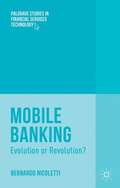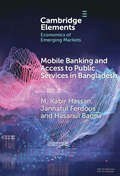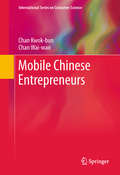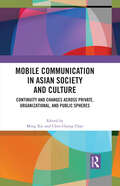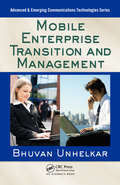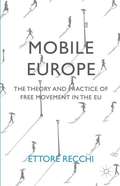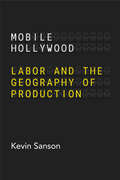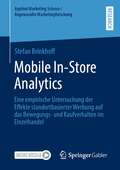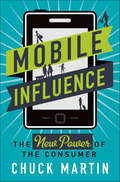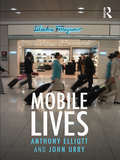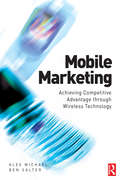- Table View
- List View
Mob Rules
by Louis FerranteThe average Mafia don knows more about effective leadership than a trunkful of Fortune 500 CEOs. For all the mob's well-deserved reputation for violence and immorality, its most successful members have always been remarkably astute businessmen. Former mobster Louis Ferrante reveals their surprisingly effective management techniques and explains how to apply them in any legitimate business. As an associate of the Gambino Family, Ferrante pulled off some of the biggest heists in U. S. history before the age of twenty-one, netting millions of dollars. His natural talent for management led bosses like John Gotti to rely on him. Now he offers time-tested Mafia wisdom, such as: * Three can keep a secret (if two are dead): Build trust with your colleagues. * You don't always need a gun to hit a target: Lead people without force. * It's never personal: When circumstances demand it, never hesitate to pull the trigger. Ferrante brings his real-life experience to the book, offering fascinating insights into Mafia behavior and sharing behind-the-scenes episodes almost as outrageous as those occurring on Wall Street every day. .
MobSquad
by Prithwiraj Choudhury William R. Kerr Susie L. MaIrfhan Rawji (MBS 2004) launched MobSquad in October 2018 to help American tech start-ups retain hard-to-find talent, many of whom struggled with U.S. work visa issues, such as software engineers with experience in artificial intelligence, machine learning, or data science. MobSquad also helped companies fill open roles by tapping into its database of pre-vetted foreign tech workers. While there was growing demand for these specialists, the talent supply in the U.S. was relatively constrained and American companies often filled positions with foreign-born workers using a temporary visa called the H-1B. However U.S. President Donald Trump temporarily suspended immigration in June 2020, including foreign workers on an H-1B visa during the COVID-19 pandemic. Rawji contemplated what kind of impact this would have on MobSquad and the tech industry in Canada. There was already evidence that a growing number of foreign tech workers were choosing Canada over the U.S. due to Trump's immigration policies. Now Rawji suspected that Trump's latest move would further accelerate this trend, and he wanted MobSquad to be ready to help companies and workers who had been counting on the H-1B.
Mobil USM&R (A): Linking the Balanced Scorecard
by Robert S. KaplanThe CEO of the marketing and refining division of a major oil company is in the midst of implementing a profit turnaround. He transforms the strongly centralized, functionally-organized division into 17 independent business units and 14 internal service companies. The division also launches a new, market-segmented strategy aimed at high-end buyers. The CEO recognizes, however, that the new organization and strategy require a new measurement system. He turns to the Balanced Scorecard (BSC) because of its ability to link measurement to strategy, and to help the new profit-center managers develop customized strategies for their local responsibilities. The case describes the development of the initial divisional BSC, the linkage of the divisional BSC to independent business unit and internal service company BSCs, and linkage of the BSC to managers' compensation. Concludes with the senior executives reflecting on how they are using the BSC in their management processes.
Mobil USM&R (A): Linking the Balanced Scorecard
by Robert S. KaplanThe CEO of the marketing and refining division of a major oil company is in the midst of implementing a profit turnaround. He transforms the strongly centralized, functionally-organized division into 17 independent business units and 14 internal service companies. The division also launches a new, market-segmented strategy aimed at high-end buyers. The CEO recognizes, however, that the new organization and strategy require a new measurement system. He turns to the Balanced Scorecard (BSC) because of its ability to link measurement to strategy, and to help the new profit-center managers develop customized strategies for their local responsibilities. The case describes the development of the initial divisional BSC, the linkage of the divisional BSC to independent business unit and internal service company BSCs, and linkage of the BSC to managers' compensation. Concludes with the senior executives reflecting on how they are using the BSC in their management processes.
Mobil USM&R (A1)
by Robert S. KaplanFirst of a two-part case on the development and use of a Balanced Scorecard (BSC) at Mobil's US Marketing and Refining Division. Split from the original (A) case to give students an opportunity to suggest objectives and measures for the division's initial BSC, without seeing the actual choices made by Mobil's managers. Describes how the CEO of the marketing and refining division of a major oil company is in the midst of implementing a profit turnaround. He has transformed a strongly centralized, functionally-organized division into 17 independent business units and 14 internal service companies. The division has also launched a new, market-segmented strategy aimed at high-end buyers. The CEO recognizes, however, that the new organization and strategy require a new measurement system. He turns to the BSC because of its ability to link measurement to strategy, and to help the new profit-center managers develop customized strategies for their local responsibilities. This case describes the development process of the initial divisional BSC, and the formulation of objectives and measures for the financial and learning and growth perspectives.
Mobil USM&R (A2)
by Robert S. KaplanSecond of a two-part case on the development and use of a Balanced Scorecard (BSC) at Mobil's US Marketing and Refining Division. This case describes the completed BSC, and how this was linked to the BSCs of the independent business units and the internal service organizations. Also describes the linkage of the BSC to managers' compensation through a new variable-pay plan. Concludes with the senior executives reflecting on how they are using the BSC in their management reviews. Focuses on the management processes surrounding the use of BSC. May be taught with Mobil USM&R (B): New England Sales and Distribution, (C): Lubricants Business Unit, and (D): Gasoline Marketing, which describe the development and use of BSCs in two independent business units and one staff department.
Mobil USM&R (B): New England Sales and Distribution
by Robert S. KaplanThe general manager of a local gasoline/distillate sales and distribution business unit must communicate a new strategy to the unit's 300 employees. An initial strategic planning exercise identified a high-priority list of opportunities that blended the parent division's national strategy with a customized, local strategy. But for the new strategy to be effective, the old measurement system, which stressed only sales volume and cost reduction, had to be replaced. The manager led the development of a local Balanced Scorecard (BSC), derived from the division scorecard (described in the (A) case). To communicate the critical features of the local BSC, the unit's senior managers established a Super Bowl competition in which all employees were challenged to achieve stretch targets on five BSC measures. This case describes the communication and management processes for the Super Bowl measures.
Mobil USM&R (C): Lubricants Business Unit
by Robert S. KaplanThe general manager of a Lubricants Business Unit in Mobil's U.S. Marketing and Refining division launched a project to develop a Balanced Scorecard (BSC) for his unit. The purpose was to provide focus for all employees of the unit, enabling it to operate on an integrated basis. After the unit's scorecard had been developed, the general manager challenged the project team to extend the effort out to every employee in the business unit. The team started by constructing a cause-and-effect tree that linked high-level business unit objectives down to positions or tasks for every individual. The team then visited all locations, using the cause-and-effect tree to link the unit's strategy and scorecard to individuals' responsibilities. This case describes the construction of individual BSCs and their impact on employee behavior.
Mobile Banking
by Bernardo NicolettiMobile is impacting heavily on our society today. In this book, Nicoletti analyzes the application of mobile to the world of financial institutions. He considers future developments and the possible use of mobile to help the transformation in products, processes, organizations and business models of financial institutions globally.
Mobile Banking and Access to Public Services in Bangladesh: Influencing Issues and Factors (Elements in the Economics of Emerging Markets)
by M. Kabir Hassan Jannatul Ferdous Hasanul BannaThis Element examines the role of mobile banking in accessing public services in Bangladesh. It also identifies the key influencing factors and challenges in accessing public services through mobile banking and suggests policy measures to overcome these challenges. Based on a survey of 300 people, the study finds that mobile banking facilitates access to public services, which is beneficial and effective for both rural and urban users, as technology can increase the quality of work. Despite the benefits, some individuals are reluctant to use the service due to high transaction costs and a lack of digital literacy.
Mobile Banking for the Unbanked
by V. Kasturi Rangan Katharine LeeThe case describes in detail the workings of two mobile banking operators in Africa-WIZZIT in South Africa and M-PESA in Kenya. It explores the dimensions of strategy that make for success in the market for the unbanked. It raises questions regarding the portability of the model to other countries and settings.
Mobile Broadband and the Telecommunications Industry in 2011
by Christine Snively Kerry Herman Lynda M. ApplegateMobile broadband carriers provide network access to the Internet for a range of devices (typically portable or mobile), including consumer devices such as smartphones, tablets and E-Readers, but also a host of new emerging devices. Mobile broadband networks enable data to travel in packets over telecommunication (telecom) companies' wireless (or cellular) networks. The number of worldwide mobile cellular subscriptions reached 6 billion in 2011, reflecting a penetration rate of 87%. This note provides some industry context for the advent and opportunities associated with mobile broadband.
Mobile Chinese Entrepreneurs
by Chan Kwok-Bun Chan Wai-WanMobile Chinese Entrepreneurs draws extensively on the narratives of sixteen small-to-medium business owners, born on the mainland, who have immigrated to Hong Kong and returned to their ancestral hometowns in China to establish their enterprises. For these executives, business and social life alike are marked by constant interplay of identities, such as individual identity/group membership and ancestral/immigrant identity. Yet as often as this juggling of multiple "selves" can be beneficial in the economic sphere, it can also lead to feelings of rootlessness and alienation. Writing with rare sensitivity, the two authors synthesize insights from economic sociology, psychology, ethnic relations, emotions, and social networks, creating an exploration of social capital and social identity comparable to similar groups of businessmen and -women in other parts of the world.
Mobile Communication in Asian Society and Culture: Continuity and Changes across Private, Organizational, and Public Spheres
by Ming XieXie and Chao present a collection of research on mobile communication in Asian communities and countries such as Bangladesh, China, India, Japan, and South Korea. With chapters written by scholars from diverse cultural and institutional backgrounds, this book provides both localized and comparative perspectives on mobile communication research. Exploring the way mobile apps are used in daily life in Asian countries, Xie, Chao, and their contributors analyze how mobile apps improve lives, help people build relationships, sustain communities, and change society for the better. They look at areas including the role of mobile apps in public service delivery and access, family communication, cultural norms and identities, organizational communication, and intercultural communication. The investigation of these topics elevates the understanding of the cultural, familial, interpersonal, organizational, and intercultural consequences of mobile communication in a global context. Through examining mobile apps use in regard to scale, scope, depth, complexity, and distinctiveness within the Asian context, this book furthers the research agenda of mobile communication and enriches our understanding of current practice and future direction of mobile communication. This book serves as a useful reference for scholars and students interested to learn more of the development and application of mobile communication from a global and comparative perspective.
Mobile Endgeräte im Unternehmen: Technische Ansätze, Compliance-Anforderungen, Management (essentials)
by Georg Disterer Carsten KleinerMobile Endgeräte wie Smartphones und Tablets versprechen zugleich einen großen Benutzerkomfort und einen hohen betrieblichen Nutzen. Deshalb nimmt deren Einsatz in Unternehmen stark zu, die Nutzung von E-Mail sowie elektronischen Kontakten und Terminen kann als Standard angesehen werden. Darüber hinaus gibt es für die Einsatzart und die technische An- und Einbindung mobiler Endgeräte verschiedene Möglichkeiten mit unterschiedlichen Vor- und Nachteilen. Etablierte organisatorische und technische Sicherheitsmaßnahmen können oft nicht greifen, da sich die mobilen Geräte - im Unterschied zu klassischen stationären Geräten - nicht in den Räumen der Unternehmen befinden und über öffentliche Kanäle und Netze kommunizieren. Daher stellt die Einbindung mobiler Endgeräte in die betriebliche Informationsverarbeitung eine Herausforderung an das IT-Management dar.
Mobile Enterprise Transition and Management (Advanced & Emerging Communications Technologies)
by Bhuvan UnhelkarAddressing the rapid evolution of global communications, this book provides step-by-step guidance on how to configure, enact, and manage the process of integrating mobile technology within an organization. The mobile enterprise transition (MET) process presented considers input from the four significant dimensions of an organization - economic, technical, process, and social - making it a well-rounded and complete process. Based on extensive research, literature review, and practical experimentation, this comprehensive text presents emerging best practices, exhaustive case studies, and examples of successful transitions. It also provides detailed references, and a glossary of key terms and commonly used acronyms.
Mobile Europe
by Ettore RecchiWith a particular focus on their integration paths, political participation and identifications, this book draws on large cross-national surveys of this specific population carried out between 2004 and 2012, as well as in-depth interviews and aggregate statistical data from a plethora of sources.
Mobile Health: Rethinking Innovation Management to Harmonize AI and Social Design (Future of Business and Finance)
by Kota Kodama Shintaro SengokuThis book examines the current status of mHealth development, regulations and the social background in Japan, South Korea and China, comparing it to the situation in the United States and the European Union and consider solutions to issues surrounding mHealth.The recent progress in mobile technology, represented by smartphones and smart watches, has been remarkable. A service called mobile health (mHealth), which uses such mobile technology to manage health, is also becoming a reality. Although the accuracy of medical devices is not as accurate as those used in medicine, the biometric information such as heart rate and SpO2 can already be monitored over a long period of time. Although the technology is maturing to the point where it can be implemented in society, it remains an unapproved service of medical care in most countries. The development and social implementation of mHealth is most active in the US, but social implementation is gradually progressing in other countries as well. In this book, we will first discuss what kind of global and harmonized regulations are desirable by comparing the regulatory reforms necessary for social implementation of mHealth. In addition, mHealth raises privacy concerns in the US because the usual behavior and biometric information of subjects is utilized by private companies. In addition, it is important to note that the behavior and biometric information of subjects collected by smart devices is automatically analyzed by AI technology, mainly machine learning, which makes the analysis a black box.
Mobile Hollywood: Labor and the Geography of Production
by Kevin SansonA free ebook version of this title is available through Luminos, University of California Press's Open Access publishing program. Visit www.luminosoa.org to learn more. Contemporary film and television production is extraordinarily mobile. Filming large-scale studio productions in Atlanta, Budapest, London, Prague, or Australia's Gold Coast makes Hollywood jobs available to people and places far removed from Southern California—but it also requires individuals to uproot their lives as they travel around the world in pursuit of work. Drawing on interviews with a global contingent of film and television workers, Kevin Sanson weaves an analysis of the sheer scale and complexity of mobile production into a compelling account of the impact that mobility has had on job functions, working conditions, and personal lives. Mobile Hollywood captures how an expanded geography of production not only intensifies the often invisible pressures that production workers now face but also stretches the parameters of screen-media labor far beyond craftwork and creativity.
Mobile Home Wealth: How to Make Money Buying, Selling and Renting Mobile Homes
by Zalman VelvelFor years, mobile homes have been the butt of jokes—and definitely under the radar of most real estate investors. Yet for a small but growing group of savvy investors, they have become a tremendous asset. Written by one of the top professionals in the business, Mobile Home Wealth is an easy-to-understand book that can guide you to one of the most lucrative investments in real estate. <p><p> The author begins by presenting the basic principles and practices of real estate investing. He then applies these principles to mobile homes, covering every step of the investment process from choosing a home to financing the purchase, negotiating the price, improving the property, and selling or renting for maximum gains. Whether you are looking for a smart addition to your portfolio or searching for a new and different business, this book will forever change the way you view mobile homes.
Mobile In-Store Analytics: Eine empirische Untersuchung der Effekte standortbasierter Werbung auf das Bewegungs- und Kaufverhalten im Einzelhandel (Applied Marketing Science / Angewandte Marketingforschung)
by Stefan BrinkhoffKaufentscheidungen im Einzelhandel werden oft erst im Geschäft selbst getroffen, daher ist der Verkaufsort von besonderer Bedeutung. Dennoch stehen Unternehmen vor der Herausforderung, dass Kunden immer seltener für klassische Werbung empfänglich sind. Daher sind Händler gezwungen, nach neuen Wegen zu suchen, um Kunden in relevanten Kaufsituationen zu beeinflussen. Eine Option bietet die personalisierte Werbung über das mobile Endgerät des Kunden, wodurch auch der aktuelle Standort im Geschäft berücksichtigt werden kann. Obwohl die Möglichkeiten von standortbasierter Werbung immer mehr an Relevanz gewonnen haben, sind wissenschaftliche Erkenntnisse hierzu bislang kaum vorhanden.Stefan Brinkhoff liefert in diesem Forschungsfeld einen bedeutenden Beitrag, indem er die Effekte von standortbasierter Werbung auf das Bewegungs- und Kaufverhalten mithilfe neuster Bluetooth-Technologie analysiert. Durch ein umfangreiches Feldexperiment mit einem der größten deutschen Textileinzelhändler leistet die Dissertation sowohl einen relevanten Beitrag für die unternehmerische Praxis als auch für die Wissenschaft.
Mobile Influence: The New Power of the Consumer
by Chuck MartinThe explosion of mobile access across the globe has shaken the foundations of the traditional sales funnel, and businesses are scrambling to adapt and find new ways to tap into the market. For all their effort, many have failed to realize that the issue is not how to reach the customer where they are, but where they are going and their mindset at the moment. With the staggering growth in the use of mobile technology as both product research and purchase point, businesses have yet to fully understand the important role mobile devices play in the basic structure of the traditional shopping model and the new importance on linking behavior with location. With the death of the traditional sales funnel comes author Chuck Martin's new model, the Mobile Shopping Life Cycle. Based on the author's in-depth research, Martin has identified the six specific moments in the timeline of the sale which marketers must target effectively in order to reach the mobile buyer. From location-based marketing to mobile payment systems, Martin's model gives marketers access to the tools necessary to build a new sales framework that properly addresses the future of the market.
Mobile Lives (International Library of Sociology)
by John Urry Anthony ElliottHow should we understand the personal and social impacts of complex mobility systems? Can lifestyles based around intensive travel, transport and tourism be maintained in the 21st century? What possibility post-carbon lifestyles? In this provocative study of "life on the move", Anthony Elliott and John Urry explore how complex mobility systems are transforming everyday, ordinary lives. The authors develop their arguments through an analysis of various sectors of mobile lives: networks, new digital technologies, consumerism, the lifestyles of ‘globals’, and intimate relationships at-a-distance. Elliott and Urry introduce a range of new concepts – miniaturized mobilities, affect storage, network capital, meetingness, neighbourhood lives, portable personhood, ambient place, globals – to capture the specific ways in which mobility systems intersect with mobile lives. This book represents a novel approach in "post-carbon" social theory. It will be essential reading for advanced undergraduate students, postgraduates and teachers in sociology, social theory, politics, geography, international relations, cultural studies, and economics and business studies.
Mobile Marketing
by Alex Michael Ben SalterIn the past 10 years mobile phones have gone from being high-end gadgets only the wealthy could afford to an essential accessory, now owned by a large portion of the population of the world. The integration of the Internet, mobility and communications at the device, service and transport level has created a new set of business opportunities. Mobile marketing has become a mainstream marketing tool and marketers must now identify and reach their mobile audience. This book is designed to teach marketeers how to tap into this potential. Mobile Marketing is as different from traditional marketing as Internet marketing was, and this book outlines methods and techniques for: * Defining and implementing a wireless marketing strategy * Making sense of what can be a technically and commercially confusing industry* Providing a wealth of carefully chosen international cases and examples to demonstrate techniques in the real world Written by experienced practitioners with experience of advising major international companies on both strategy and individual campaigns in the mobile sector it is an essential guide and reference for professional marketeers.


